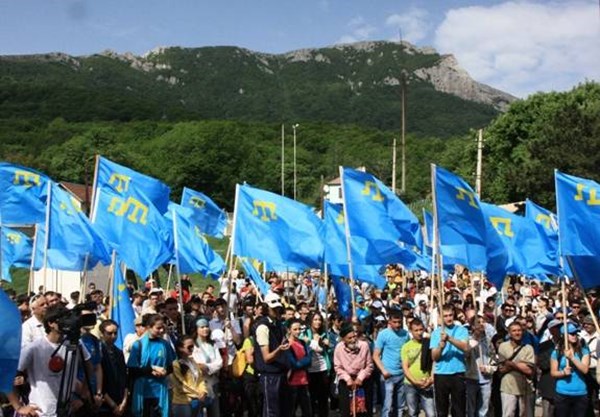FIDH: The Mejlis ban may lead to a wave of persecution of Crimean Tatars
The International Federation for Human Rights (FIDH) and the Ukrainian Helsinki Union for Human Rights condemn the persecution of the Mejlis of the Crimean Tatar People in Crimea. This was stated in an official statement on the International Federation for Human Rights website on Wednesday, March 2, as reported by Krym.Realii. The report also reviewed the actions of the Russian authorities in Crimea and the case scheduled for the 3rd of March in court, which aims to prohibit the Mejlis on the peninsula.
"The decision on the qualification of the Mejlis as an extremist organization may result in criminal prosecution not only of the Crimean Tatars, who participate in its work, but also of all supporters of the Mejlis as a whole", the statement of the International Organization reports.
The FIDH expressed concern that if the symbols of the Mejlis are banned, "uncertainty will prevail regarding the use of the flag of the Crimean Tatars". FIDH stressed that this flag is not only the symbol of the Mejlis but of all Crimean Tatars.
"The decision to ban the Mejlis, on suspicion of the "extremist activity", can open the way for a massive wave of persecution of the Crimean Tatars for whom the Mejlis is a symbol of the struggle against the long period of repression," the FIDH President, Karim Lahidji, said.
"For over two centuries, the Crimean Tatars were subjected to brutal discrimination and repression. In the mid-twentieth century, the Soviet leaders forcibly deported about 200,000 Crimean Tatars to Central Asia. For over half a century, the Crimean Tatars were forbidden to live in their homeland and some died trying to return. Cultural and spiritual heritage of the communities on the peninsula was completely destroyed. The Crimean Tatars were allowed to return to Crimea only in 1989," the International Federation for Human Rights stated.
The statement of the International Human Rights Organization reported that after the annexation of Crimea, the leaders of the Crimean Tatar community were prosecuted on politically motivated charges. Hundreds of Crimean Tatars fled because they were "in opposition to the forced imposition of the Russian nationality".
Human rights defenders also reminded that it is widely known that, after the so-called referendum on the 18th of March 2014, citizens of Ukraine on the Crimean Peninsula were forced to abandon Ukrainian citizenship and apply for Russian passports.
The Russian Prosecutor of Crimea, Natalia Polonskaya, has appealed to the court demanding to ban the Mejlis of the Crimean Tatar people and to recognize them as extremist. The court is the Kremlin-controlled Supreme Court of Crimea in Simferopol.
An Executive of the Crimean Tatars stated that the submitted application contains many legal inconsistencies and the appearance of this lawsuit is politically motivated.
The Crimean Human Rights group has appealed to the international organizations with a statement on the inadmissibility of the ban of the Mejlis of the Crimean Tatar People in Crimea.
The European Union has already expressed concern about the intention to ban the activities of the Mejlis of the Crimean Tatars.
After the annexation of Crimea by Russia in early 2014, the Russian authorities banned the leaders of the Crimean Tatars, Refat Chubarov and Mustafa Dzhemilev, from entering the peninsula for five years.
